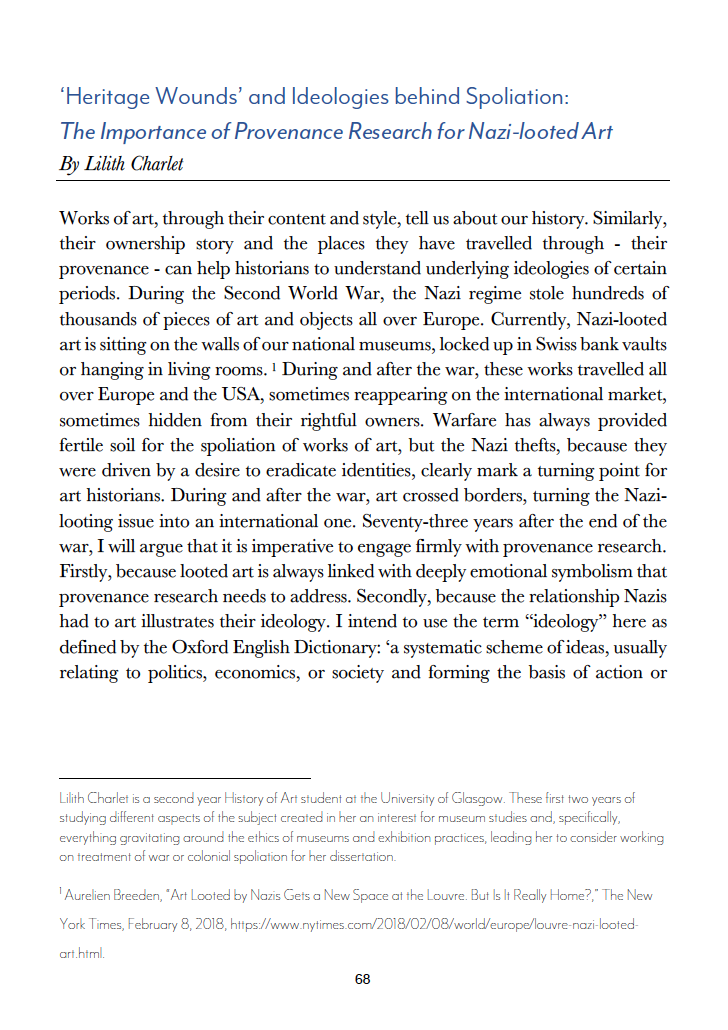‘Heritage Wounds’ and Ideologies behind Spoliation
The Importance of Provenance Research for Nazi-looted Art
DOI:
https://doi.org/10.36399/GroundingsUG.12.162Keywords:
Nazi-looted Art, Restitution, Provenance, Stolen Art, Holocaust, Museum StudiesAbstract
No abstract provided.
References
Adler, Andrew. “Expanding the Scope of Museums’ Ethical Guidelines With Respect to Nazi-looted Art: Incorporating Restitution Claims Based on Private Sales Made as a Direct Result of Persecution.” International Journal of Cultural Property 14 (2007): 57-84.
Ahuvia, Aaron C. “Beyond the Extended Self: Loved Objects and Consumers’ Identity Narratives.” Journal of Consumer Research 32, no. 1 (June 2005): 171-184.
Belting, Hans. “Introduction to the English Edition.” In The Germans and their art: a troublesome relationship, 1- 32. New Haven: Yale University Press, 1998.
Breeden, Aurelien. “Art Looted by Nazis gets a New Space at the Louvre. But Is It Really Home?”, New York Times, February 8, 2018. https://www.nytimes.com/2018/02/08/world/europe/louvre-nazi-lootedart.html.
Cuba, Stephanie. “Stop the Clock: The Case to Suspend the Statute of Limitations on Claims for Nazi-Looted Art.” Cardozo Arts & Ent. L.J., vol. 17 (1999): 469-474.
Feliciano, Hector. The Lost Museum. Translated by the author and Tim Bent. New York: Basic Books, 1997.
Fladmark, J.M. Heritage and Museums: Shaping National Identity. Aberdeen: Robert Gordon University, 2000.
Garrett, Rebecca L. “Time for a change? Restoring Nazi-Looted Art to Its Rightful Owners.” Pace International Law Review 12, no. 2 (Fall 2000): 367-395.
Goggin, Mary-Margaret. “‘Decent’ vs. ‘Degenerate’ Art: The National Socialist Case.” Art Journal, vol. 50, no. 4 (Winter 1991): 84-92.
Hitler, Adolf. « Speech Inaugurating the ‘Great Exhibition of German Art’.” In Art in Theory 1900-1990, edited Charles Harrison and Paul Wood, 423-426. Oxford: Blackwell Publishers, 1992.
Jelavich, Peter. “National socialism, art and power in the 1930s.” Past & Present 164, no. 1 (1999): 244-265.
Kaplan, Flora E.S. Museum and the making of ‘ourselves’: the role of objects in national identity. New York: Leicester University Press, 1994.
Levi, Neil. “‘Judge for yourselves !’ – The ‘Degenerate Art’ Exhibition as Political Spectacle.” October, vol. 85 (Summer 1998): 41-64.
Oxford English Dictionary Online. “Ideology, n.” Accessed March 8, 2019. http://www.oed.com/view/Entry/91016?redirectedFrom=ideology.
Petropoulos, Jonathan. “Art Dealer Networks in the Third Reich and in the Postwar Period.” Journal of Contemporary History, vol. 52 (2016): 546-565.
Savoy, Bénédicte. “La mémoire restituée des œuvres volées [The restored memory of stolen art.]” Interview by Cristelle Terroni. La vie des idées, June 26, 2015. https://laviedesidees.fr/La-memoire-restituee-des-oeuvres-volees.html.
Savoy, Bénédicte. « L’art dégénéré 4/4 : La blessure mémorielle [Degenerate Art 4/4 : the memorial wound]. » Interview by Christine Lecerf and Franck Lilin, France Culture, May 24, 2018. Audio, 49:05-51:42. https://www.franceculture.fr/emissions/lsd-la-serie-documentaire/lart-degenere-44-la-blessure-memorielle-0.
Savoy, Bénédicte, and Sarr, Felwine. Rapport sur la restitution du patrimoine culturel africain. Vers une nouvelle éthique relationnelle [Report on the restitution of African cultural heritage. Towards new relational ethics]. Paris : Ministère de la Culture, 19th November 2018. PDF. http://restitutionreport2018.com/sarr_savoy_fr.pdf.
Tatzkwo, Monika and Müller, Mellisa. Lost Lives, Lost Art, edited by Jacqueline Decter. Translated by Jennifer Taylor and Tammi Reichel. Barnsley: Frontline Books, 2010.

Downloads
Published
Issue
Section
License
Copyright (c) 2019 Lilith Charlet

This work is licensed under a Creative Commons Attribution 4.0 International License.
The CC BY 4.0 license is a Creative Commons license. This is a non-copyleft free license that is good for art and entertainment works, and educational works. It is compatible with all versions of the GNU GPL; however, like all CC licenses, it should not be used on software. People are free to: Share — copy and redistribute the material in any medium or format; Adapt — remix, transform, and build upon the material for any purpose, even commercially. The licensor cannot revoke these freedoms as long as you follow the license terms. But they must conform to the following terms: Attribution — You must give appropriate credit, provide a link to the license, and indicate if changes were made. You may do so in any reasonable manner, but not in any way that suggests the licensor endorses you or your use. No additional restrictions — You may not apply legal terms or technological measures that legally restrict others from doing anything the license permits.
Please check individual article PDF copies to see if any additional restrictions apply.







